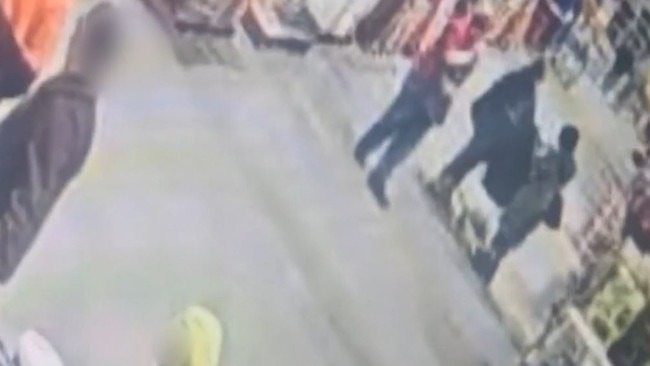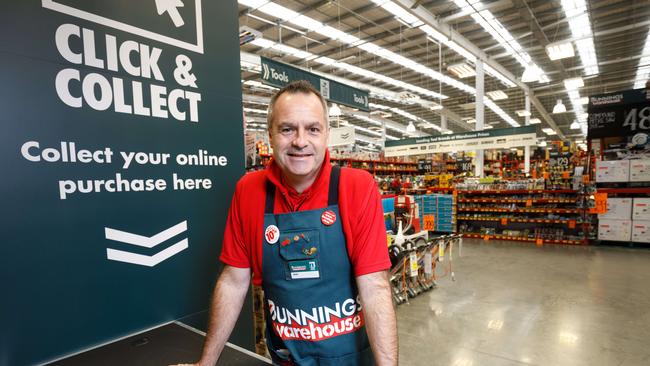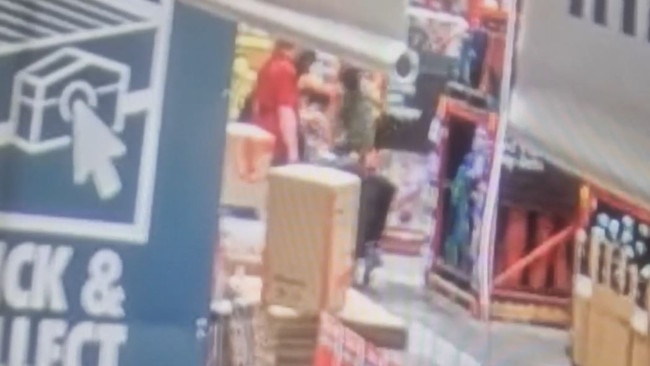New Bunnings CCTV shows epidemic of violence against retail workers as in-store crime surges
The nation’s retailers are suffering an epidemic of violence as thugs brazenly steal, threaten and assault innocent workers for the crime of doing their job. See the video.
True Crime
Don't miss out on the headlines from True Crime. Followed categories will be added to My News.
Exclusive: The nation’s retailers are suffering an epidemic of violence as thugs brazenly steal, threaten and assault innocent workers for the crime of doing their job.
Workers are increasingly being punched, threatened with weapons and enduring death threats while working at supermarkets, shopping centres and grocery stores.
Major retailers are calling to be allowed to use facial recognition technology (FRT) in a bid to catch offenders as shoppers flood stores in the lead up to Christmas when retail crime is expected to surge.
Retail crime cost the Australian sector about $8 billion in the last financial year, representing nearly two per cent of sector wide annual turnover.
Attacks involving weapons have jumped 33 per cent, according to global software company Auror that has recorded nearly 800,000 retail crime events in the past year.
Knives and blades are the most commonly used weapon to assault or threaten retail staff followed by hammers.
Kmart and Target have experienced a 62 per cent increase in consumer-threatening incidents over the past year with anti-social behaviour behind 86 per cent of incidents.
The two chains have seen a 44 per cent increase in high-risk incidents, with physical assaults rising by 31 per cent and anti-social threatening situations rising by 76 per cent.
“It’s not acceptable that anyone feels threatened either verbally or physically in their place of work – and that right should apply equally to people who work in retail in jobs that support and service communities right around Australia every day,” Kmart and Target’s chief people and capability officer Tristram Gray said.
Watch the exclusive video above.

Woolworths has also reported a 20 per cent increase in incidents over the past year across supermarkets, Metro stores and Big W outlets.
Only 10 per cent of offenders are responsible for about 63 per cent of crime while the rate of violence to theft is 80:20, a ratio that was flipped just a decade ago.
Bunnings managing director Michael Schneider said workers across the retail sector including teenagers were copping foul verbal abuse, intimidation and violence.

“Our youngest team members are at school, they’re doing their first job, and we’ve got team members who are in their 70s and 80s,” he said.
“If you’re a 15 or 16 year old working at Bunnings or McDonalds or Coles or whatever and someone’s aggressive and violent towards you that’s probably going to live with you for many years, if not for the rest of your life.”
Bunnings released shocking CCTV footage of incidents of aggression and violence against staff after the Office of the Australian Information Commissioner (OAIC) found the hardware giant had breached the privacy of customers by using facial recognition technology.

The incidents captured on film include a naked man following a staff member, a customer wielding a gun and another man holding a knife to a staff member’s throat.
Mr Schneider said as a major employer he had a responsibility to keep his employees safe and the hardware giant needed to be able to use facial recognition technology to catch repeat offenders.
“We want every tool at our disposal to keep our team members safe,” he said.
“I think that the general public want to know that when they’re shopping with us, that they’re not going to be confronted with some of the images that you guys and many other media outlets ran a couple of weeks ago.”
The Shop, Distributive and Allied Employees Association, which represents 200,000 workers, is understood to support the use of FRT to protect workers if robust protections are in place.
National Retail Association (NRA) Director of Policy David Stout said only 10 per cent of offenders were responsible for 65 per cent of retail crime and said retailers needed every tool at their disposal.
“The shift in crime trends is alarming, and it’s clear that current frameworks need to be updated to cope with this issue,” he said.
“We need modern reporting systems and immediate consequences for high harm repeat offenders.
Australian Retailers Association chief industry affairs officer Fleur Brown said retail crime had skyrocketed during the pandemic and had never abated.
“It’s been quite catastrophic for the retail sector,” she said.
“Retail crime intensifying has put many workers in a position where they may be quite apprehensive, stressed, if they are actually involved in aggression or assault.”
New Zealand retail lobby group Retail NZ has also called for retailers to be allowed to use FRT stores to protect workers.





